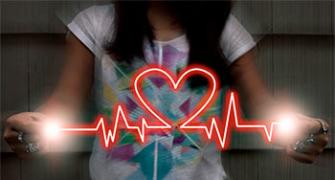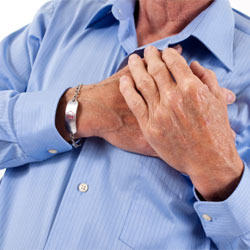Get rid of these bad habits, says Upendra Kaul.

INTERHEART, a very significant global study answers why Indians are more prone to cardiovascular diseases such as heart attacks and brain strokes compared to their Western counterparts.
The study identifies nine modifiable risk factors that explain the occurrence of heart attacks in 90 per cent cases.
These are divided into two parts: Adverse risk factors and protective risk factors
While the adverse risk factors are smoking, bad cholesterol, high blood pressure, diabetes, abdominal obesity, mellitus and psycho-social stress, the protective risk factors are regular intake of fruits and vegetables, regular exercise and moderate alcohol consumption.
Globally, all nine risk factors -- except alcohol, which had only a modest statistical significance -- are significantly associated with heart attacks.
The strongest risk predictor globally was found to be dyslipidemia (high level of lipids: cholesterol, triglycerides or both), followed by current smoking.
The risk associated with lipids and smoking was particularly marked in the young (below 55 years of age in men and below 65 years in women) versus the older.
Here are some preventive strategies:
Smoking
Smoking over 20 cigarettes or bidis a day increases the risk of heart attack by five times, 10 to 19 cigarettes or bidis increases the risk by three times and smoking less than five cigarettes or bidis per day increases the risk by 1.5 times.
Smoking one cigarette shortens your lifespan by 11 minutes and people exposed to second hand smoke have 90 per cent excessive rate of heart attacks.
Quitting smoking at any age nullifies this risk in three years.
It is never too late to give up.
Reducing smoking to a minimum also helps.
Bad cholesterol
High levels of bad cholesterol (LDL cholesterol) and low levels of good cholesterol (HDL cholesterol) promote heart disease.
One per cent reduction in cholesterol leads to two per cent reduction in heart attacks.
High risk individuals with multiple risk factors and even modestly raised levels of LDL cholesterol need the statin group of drugs (simvastatin, atorvastatin or rosuvastatin).
All patients with proven heart and vascular disease need these drugs in high doses.
These tablets should be taken under medical supervision and, once required, need to be continued for long term.
Psycho-social stress
Chronic stress is associated with increased secretion of adrenaline, which raises blood pressure and predisposes people to diabetes.
Stress management programmes that comprise exercises, meditation and yoga are useful in alleviating stress.
These approaches aim at blunting the adrenaline response to stress and have added advantage of being safe.
Drug treatment, if needed, must be under specialised supervision.
Regular exercise as a preventive risk factor is a very useful adjunct in bringing down blood pressure, blood sugar and bad cholesterol levels.
This, combined with intake of plenty of seasonal fruits and green vegetables, goes a long way in preventing heart attacks and strokes.










